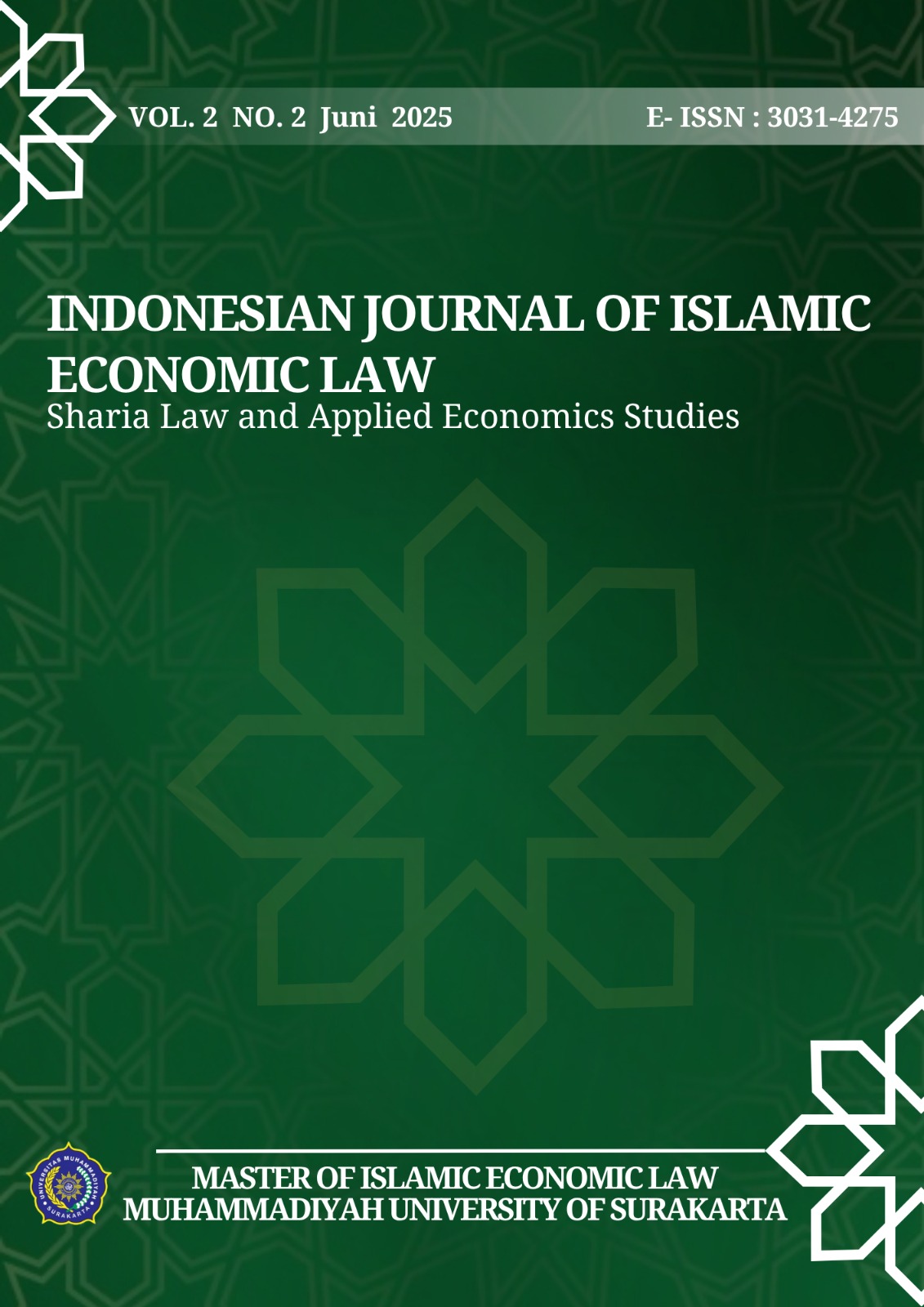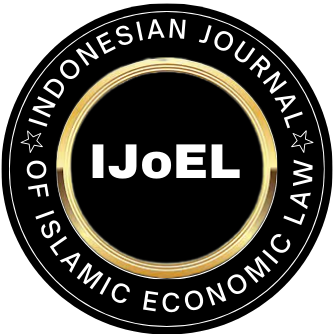دراسة التحليل المقارنة عقد المضاربة من منظور فتوى المحكمة العليا وفتوى مجلس الشرعي الوطني
An Analysis of Mudarabah Contracts in The Perspective of The Supreme Court Regulation and DSN-MUI Fatwa
DOI:
https://doi.org/10.23917/ijoel.v2i2.9957Keywords:
Mudharabah Agreement, KHES, DSNAbstract
The purpose of this study is to analyse how the method of sharia contracts in Supreme Court Regulation No. 2 of 2008 concerning the Compilation of Sharia Economic Law (KHES) is compared with the DSN MUI fatwa. To find out the differences and similarities in the application of sharia contract methods between KHES in Supreme Court Regulation No. 2 of 2008 and the DSN MUI fatwa. The scope of research in this research is descriptive, and the approach in this research is a comparative approach and a statutory approach. The analysis used in this research is inductive analysis. The result of this research is in order to compare the method of interpretation of sharia contracts, Supreme Court Regulation No. 100 of Law No. 2 of 2008 concerning the Compilation of Sharia Economic Law (KHES) and DSN-MUI fatwa have different approaches in the implementation of Mudharabah contracts. KHES focuses more on the principle of legal clarity and the initial intention of the parties, because the contract must be made and implemented in accordance with the initial agreed objectives. The interpretation in KHES is more legalistic, so it serves as a court guideline in resolving legal disputes that prioritize clarity, justice and understanding between investors and fund managers. Meanwhile, DSN-MUI Fatwa No. 115/DSN-MUI/IX/2017 tends to use a more flexible jurisprudential approach. This fatwa provides specific guidelines for various forms of Mudharabah contracts such as limited Mudharabah and absolute Mudharabah, making it easier to apply in Islamic financial institutions according to different business contexts. The principles also include transparency and flexibility in capital management, profit sharing and risk responsibility. The similarities of these two directives include a strong foundation in Shariah principles, particularly with regard to transparency, fairness and agreement in principle on the profit ratio. In addition, both KHES and Fatwa DSN-MUI agree that the risk of loss is borne by the investor, unless there is negligence on the part of the fund manager. On the other hand, differences arise in the technical details, where KHES demands clarity and more strictly limits contractual roles, while Fatwa DSN MUI allows variations in the form of capital and provides greater flexibility in the division of roles and profit sharing. Thus, KHES is more important as a legal reference in court, while the DSN-MUI fatwa plays an important role in the operational practices of Sharia financial institutions, which need guidance in managing fair and Sharia-compliant business cooperation.
Downloads
References
Agung, Mahkamah. Peraturan Mahkamah Agung Republik Indonesia Nomor : 02 Tahun 2008 Tentang Kompilasi Hukum Ekonomi Syari’ah (n.d.).
Aminuddin Shofi, Muhammad, and Muhammad Alwi Sihab Bashar. “Penafsiran Akad Dan Penyelesaian Sengketa Dalam Hukum Perikatan Perspektif Kaidah Fikih Muammalah Kulliyah (Studi Komparasi KHES Dan KUHPerdata).” JURISY: Jurnal Ilmiah Syariah 2, no. 1 (2022). https://doi.org/10.37348/jurisy.v2i1.148.
Awaluddin, Awaluddin, and Andis Febrian. “Kedudukan Fatwa DSN-MUI Dalam Transaksi Keuangan Pada Lembaga Keuangan Syariah Di Indonesia.” Al Hurriyah : Jurnal Hukum Islam 5, no. 2 (2020). https://doi.org/10.30983/alhurriyah.v5i2.3366.
Bungin, Burhan. Penelitian Kualitatif: Komunikasi, Ekonomi, Kebijakan Publik, Dan Ilmu Sosial Lainnya. Jakarta: Kencana, 2017.
Chasanah Novambar Andiyansari. “Akad Mudharabah Dalam Perspektif Fikih Dan Perbankan Syariah.” SALIHA: Jurnal Pendidikan & Agama Islam 3, no. 2 (2020). https://doi.org/10.54396/saliha.v3i2.80.
Dewan Syariah Nasional Majelis Ulama Indonesia. Fatwa Dewan Syariah Nasional-Majelis Ulama Indonesia Tentang Akad Mudharabah (2017).
Dkk, Hardanim. Metode Penelitian Kualitatif & Kuantitatif. Cet, I. Yogyakarta: Pustaka Ilmu, 2020.
Elhas, N I. “Kompilasi Hukum Ekonomi Syariah (KHES) Dalam Tinjauan Umum Hukum Islam.” Al-Tsaman: Jurnal Ekonomi Dan Keuangan Islam, 2020.
Firdausi Nuzula, Annisa, Ahmad Junaidi, Luqman Hakim, and Mahatir Muhamad Ihsan. “Praktik Hutang Piutang Online Pada Aplikasi Pinjaman Now Tinjauan Fatwa DSN MUI Dan KHES.” Jurnal Antologi Hukum 2, no. 2 (2022). https://doi.org/10.21154/antologihukum.v2i2.1328.
Indonesia, Republik. Mahkamah Agung Epublik Ndonesia Nomor 02 Tahun 2008, n.d.
Isman, and Risdayani. “Istiqra Al Ma’nawiy’s Reasoning: As a Model of Indigenzation and Contextualization of Islamic Law (Hazairin and Hasbi Ash Shiddiqiy’s Thought).” Al-Afkar, Journal For Islamic Studies 7, no. 2 (2024). https://doi.org/https://doi.org/10.31943/afkarjournal.v7i2.1204.
Japar, R, Y Karmila, and R A Masse. “OPTIMALISASI PENERAPAN AKAD MUDHARABAH DALAM KONTEKS LEMBAGA KEUANGAN SYARIAH.” Jurnal Teknologi Pendidikan …, 2024. https://journal.usimar.ac.id/index.php/jtpm/article/view/26.
Kamalia, E R. “Perbankan Syariah: Prinsip Yang Diamal Dan Manfaat Yang Didapat.” El-Wasathiya: Jurnal Studi Agama, 2024. https://ejournal.kopertais4.or.id/mataraman/index.php/washatiya/article/view/5724.
Kholili, Muhammad. “SOCIOLOGICAL STUDY OF THE DEVELOPMENT OF ISLAMIC BANKING WITHIN THE LEGAL SYSTEM IN INDONESIA.” Journal of Sharia Economics 4, no. 2 (2023). https://doi.org/10.22373/jose.v4i2.3413.
Muslimin, Muslimin, Bintang Bintang, Evi Hendri Susanto, Fitria Agusti, and Alfin Dani Arwanto. “Efektivitas Khes Dan Fatwa DSN-MUI Terhadap Penegakan Hukum Ekonomi Syariah Di Indonesia.” Jurnal Pendidikan Tambusai 6, no. 2 (2022).
Purnomo, Agus. Dinamika Fatwa Dalam Hukum Positif. Malang: Inara Publisher Malang, 2020.
Putra, Panji Adam Agus. “Konstruksi Akad Mudhârabah Dalam Fatwa Dewan Syariah Nasional-Majelis Ulama Indonesia Nomor: 03/Dsn-Mui/Iv/2000 Tentang Deposito.” Fastabiq: Jurnal Studi Islam 1, no. 1 (2020).
Rasyid, M Ridhwan Ar, and Efri Syamsul Bahri. “Pertimbangan Dewan Syariah Nasional Dalam Menetapkan Fatwa Akad Transaksi Syariah Di Indonesia.” Perisai : Islamic Banking and Finance Journal 3, no. 2 (2019). https://doi.org/10.21070/perisai.v3i2.2020.
Sa’diyah, Halima Tus, Sitti Lailatul Hasanah, Abdul Mukti Thabrani, and Erie Hariyanto. “Sejarah Dan Kedudukan Kompilasi Hukum Ekonomi Syariah Dalam Peraturan Mahkamah Agung Nomor 2 Tahun 2008 Di Indonesia.” Al-Huquq: Journal of Indonesian Islamic Economic Law 3, no. 1 (2021). https://doi.org/10.19105/alhuquq.v3i1.3460.
Siregar, Salmanul Hakim. “Mudarabah Dalam Perspektif Hukum Ekonomi Syariah Dan Implikasinya Terhadap Lembaga Keuangan Syariah.” Ijtihad 36, no. 1 (2020).
Socmitro Ronny Hanitijo. Legal and Yurimetric Research Methods. Jakarta: Ghalia Indonesia, 2008.
Sugiyono. Metode Penelitian Kuantitatif, Kualitatif, Dan R&D. Cet. XXVII. Bandung: Penerbit Alfabeta, 2017.
Tamam, Ahmad Badrut. “Kedudukan Fatwa Majelis Ulama Indonesia (MUI) Dan Fatwa Dewan Syariah Nasional (DSN) Dalam Sistem Hukum Indonesia.” Al-Musthofa: Journal of Sharia Economics 04, no. 01 (2021).
Tim Redaksi. Kompilasi Hukum Ekonomi Syariah (KHES). Bandung: Fokus Media, 2010.
Waldi Nopriansyah, Abdul Mujib, and Ali Sodiqin. “Hukum Jaminan Dalam Pembiayaan Modal Kerja (Akad Muḍārabah) Di Bank Syariah Dalam Pendekatan Maqāṣid Syarī’ah.” BUSTANUL FUQAHA: Jurnal Bidang Hukum Islam 4, no. 1 (2023). https://doi.org/10.36701/bustanul.v4i1.870.
Yumna, Laila, and Azhar Taufik. “ANALISA KOMPILASI HUKUM EKONOMI SYARIAH DAN FATWA DEWAN SYARIAH NASIONAL PERSPEKTIF SOSIOLOGI HUKUM.” Jurnal Emanasi, Jurnal Ilmu Keislaman Dan Sosial 6, no. 1 (2023).
الجبار, صهيب عبد. “المسند الموضوعي الجامع للكتب العشرة,” n.d.
الحنفي, عبد الغني الغنيمي الدمشقي الميداني. “اللباب في شرح الكتاب.” بيروت - لبنان: المكتبة العلمية, n.d.
الدبيان, دبيان بن محمد. “المعاملات المالية أصالة ومعاصرة,” 2011.
النملة, عبد الكريم. الجامع لمسائل أصول الفقه. الطبعة الأ. الرياض: مكتبة الرشد, 2000.
———. المهذب في علم أصول الفقه المقارن. Edited by الطبعة الأولى. الرياض: مكتبة الرشد, 1999.
جامعة المدينة العالمية. أصول البحث الأدبي ومصادره. ماليزيا: جامعة المدينة العالمية, n.d.
عمر, عبد الله بن. منهاج الوصول في علم الأصول. بيروت: دار الكتب العلمية, 2006.
قندي, لعلاء الدين السمر. “تحفة الفقهاء.” بيروت - لبنان: دار الكتب العلمية, 1983.
مصيلحي, عبد الفتاح بن محمد. “جامع المسائل والقواعد في علم الأصول والمقاصد.” المنصورة، مصر: دار اللؤلؤة, 2022.
Downloads
Submitted
Published
How to Cite
Issue
Section
License
Copyright (c) 2025 sitinawal ibrahim, Saifullah Saifullah

This work is licensed under a Creative Commons Attribution 4.0 International License.










